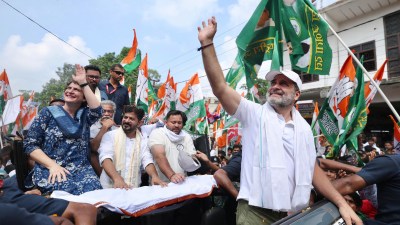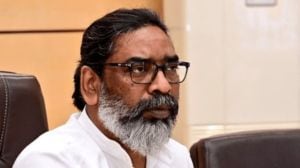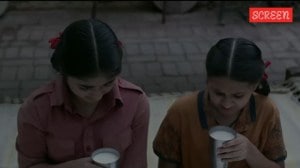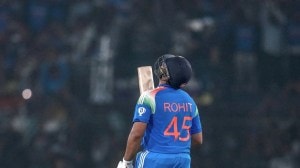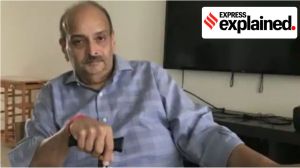Every political life ends in failure
Mani Shankar Aiyer is a senior Congress leader
Mani Shankar Aiyer is a senior Congress leader
What does spirituality mean to you?
It is something very noble which was grossly misused by most of humanity and through most of history. In essence,it is about that which is not material,that which cannot be reduced to those obvious realities around us. It is about a world of the mind anchored in a value system which cannot be justified in terms of reason,and which exists in the realm of ought rather than in the realm of is. So whatever has appeared to the human mind anchored in value systems constitutes spirituality.
Most of it has been written up and retained through religious instructions. So although spirituality today is so often affiliated to religious beliefs,it neednt be so. For me,it is rather about the life of the spirit,as distinct to the life of the body.
How does it manifest concretely in your life?
I was born a Hindu,but I do not espouse the body of beliefs called Hinduism. Most of the time I tend to be an atheist,though at times of personal crisis I find myself pushed to find a straw to hang on — in the direction of agnosticism,but rarely of religion.
So much of our culture is bound by religious beliefs and practices that it is very difficult to disentangle the spiritual from the religious. Yet,we are not good human beings because we have been so instructed by religious books; rather,because value systems have been created by society and through the process of nurturing,as distinct from nature.
There is a huge influence of religion on spirituality but one can talk about the latter without reference to a particular set of beliefs embedded in religion. Also,most of the things we agree should be done or not be done can be found in the bodies of all religions. The differences are at the margins,not at the core. If you deal with the essence of religions and not the periphery,you can build a secular society.
On the overall,I am convinced it is possible for a society to live without religion,but impossible for it to live without the values embodied by spirituality. Spirituality as the life of the mind is essentially the consensus at any point in time within the individual of the totality of values and its prioritisation,which enable him to live his life. You cannot determine it mechanistically or materialistically in the Marxist sense of the word. It comes out of an evolution of ought from is.
What were the main influences in your life that shaped your values?
The single biggest influence on my life was my mother. My father was killed in an air crash when I was 12 years old. And in any case my mother had moved away from my father when I was four,first to Madras,then to Shimla,while he had stayed in Lahore and was visiting us from there. After Partition,we were in Delhi,six people in one single room. My mother therefore decided to put us all in boarding school so that our highly disrupted education could be resumed. I was only eight years old. After my father was killed,my mother moved in the boarding school.
So on the overall I grew up under her shadow. She not only gave me many of the values I have,but also many of the values I rejected. She was a deeply religious person and often my brother and I would find that her spiritual values were wrong because of her religious beliefs,while many other spiritual values could stand alone,and did not need the sanction of religion. After all,do I desist from either killing or kissing you at this moment because the Gita says it? No,this is part of my values as a human being.
How did you end up rejecting religion?
It was a process of evolution. As a child,rituals had some attraction. Around the age of twelve,I read the entire Gita. I participated in major rituals that would take place in my village around that same time. I took them as the thing to do.
But between the age of 14 and 16,the questioning became very acute. My mother had taken up in a big way with the Swami Sivananda ashram near Rishikesh. Her idea of a happy weekend or a holiday was to go off to that ashram,or spend time doing pujas at home. I began questioning those childish rituals,pretending to bathe,feed,dress the god. I also found the whole set-up in the ashram to be very unequal. I was beginning to boil with rage at social injustice. And it was clear to me that the better off you were,the more likely of receiving the gurus attention. And the worse off you were,the more you had to wait. I began suspecting that all the special favours my mother was receiving,was born from the bogus impression these people had that since she had three sons in the most expensive school of India,she must be a woman of some means. I also did not like the glib way in which answers were given; and the total failure on the part of acolytes to question either the assumptions or the conclusions of the gurus. In my education I was being taught there is a logical process from a hypothesis,to a theory,then to a law,all based on scepticism and repeated testing. This process of reason was for me superior to anything related to intuition,and there was no reconciliation between the two. This is why by the age of 16 I had become a raving atheist. Also this is the time I got exposed to Karl Marx and was very impressed with his value system,which said from each according to his ability and to each according to his need. It seemed to me a far greater spiritual injunction than the ten commandments. I could not see how believing in unreason could be reconciled with unscientific beliefs. At least not until I met a swamiji from the Ramakrishna Mission in my twenties,who explained that intuition begins where reasoning ends. What we know is comprised between the realms of scientific knowledge. And what we dont know,we call God. I accept there is a huge amount we dont know and I am willing to give it the name of God. But if we dont know It,how can we give It attributes?
Since the boundaries of knowledge constantly expand,what is not known is constantly shrinking. In other words,God cannot be omnipotent,omniscient and so on. It is a constantly diminishing entity.
That reality of the unknown might explain some of the strange things that happen in life,when the unexpected occurs. There definitely is such a thing as good and bad fortune.
But is that good or bad fortune all by chance?
I do not know if it is by chance or not. All I know is that there are factors that cannot be foreseen,not so much in the material world but in the world of the spirit. Why did Rajeev Gandhi pick on me to become his xxxxx? And if his brother had not died,he would not have come to politics,or if his mother had not died,he would not have become a person of consequence for another twenty years. And if I had been posted back to India one year earlier,if I had not been sent by his mother to do a job I disliked,I would not have come to his friend Arun Singh and asked him to get me out of it and back to the Foreign Service. All this is happenstance. When I put in an application,it was turned down by the Principal Secretary. So it never reached Rajeev Gandhi. I then thought it was the end of the road. But the Principal Secretary was removed two weeks later. And that opened the road for Rajeev Gandhi to ask me to join him within a few weeks. None of it was in my hands.
I can give you countless examples of things happening with no possible rational explanation. For instance,my sister. She was not married by the age of 27. My mother,deeply concerned,was told that someone in the family had killed a cat and that a special puja had to be done for nine days to make up for it. Only one person in Delhi was available to perform it. He came with another person,who noticed my sister,and offered to marry his son to my sister. And they have been married for 35 years. These kinds of things are inexplicable rationally,but they do take place.
So are things ordained in life?
Well,I have to accept there is an important dimension in my life that I do not know or understand. So I might as well invoke this dimension at times,especially at tough ones. And say,God,if You exist,this is the time to come and help me,not necessarily believing there is a God,nor that He would help me,but so much wishing for it! On the day my votes were being counted for instance,I certainly said that to myself.
So you do not become an agnostic at these times,but rather a believer?
Not really,because I am not sure how much I believe in my prayer. It is more like a casual sentence I throw out to somebody I dont believe exists,but who just might,in a very friendly way,talking to Him like to my closest buddy.
So it is not about a conviction that there is a protective force in your life?
No,it is more like a backup. In case You do exist,then why dont You help?
So in moments of really difficult challenges,where do you find the energy?
Nixon once said that life is not about success or failure,once you have gotten what you wanted,it does not matter anymore. Instead,life is about challenges and overcoming them. It is not about being happy or not,happiness is a very meaningless term. It is not even about being successful or not. The real satisfaction in my life comes from having challenges and meeting them. It gives a purpose to life. And as long as there is a purpose in life,life is worth living.
So there is such a thing as a purpose in life?
Each person has to find his own purpose. And it keeps evolving. When I was 22 years old,my purpose was to get a posting where I could find a girlfriend. That obviously cant be the case today. But the essence of the purpose is the same — it is about facing challenges. Like for instance now it is about recovering from an electoral defeat. So long as there is a challenge and you meet it,you have secured the purpose of your life.
But why would you want to overcome this electoral defeat unless there was a larger purpose?
I want to overcome it in order to win again and continue to realize my political ambitions.
But why those political ambitions?
At the end of the day,it is only about vulgar ambition.
What for?
That is basically what gives me a kick. The sense of achievement coming with recognition. There is no point rising to lonely spiritual heights. I want an audience for that.
And I want it,even though I know that every political life ends in failure,except that which is cut-off in mid-flight. Look at Napoleon,maybe the most heroic of all,and his miserable lonely end,with only his jailor to talk to; look at Churchill — such a hero on victory day,and two months later rejected by his people.
So why did you pick politics in the first place?
For two reasons. One is public service,the second is being personally recognised for that public service. It is not a selfless choice.
In politics I have had an ideology not in accord with the present ideology,which is one of the reasons I have been so much on the margins. I should have been born 30 years earlier.
Why did you pick up that ideology?
The basic reason for my being a socialist originates in my envying some of the Dhoon school boys,who were better off materially but who in no other respects appeared to me to be worth being better off. That personal experience introduced me to social injustice. And I always felt that the purpose of public service is to work towards the diminution of social inequality. When I find an economic system that says lets accelerate growth to provide us with the resources to fight poverty,but in the process inequalities will increase,then I do not feel there is integrity of purpose in it. If there were a choice to be made between education or health for all and growth for some,I would at least choose to modulate the consequences of inequality. Whereas so much of what we do is aggravating inequality; despite all the additional resources,inequalities do not decrease,because people are not empowered to build their own lives. And that is why I am such a passionate advocate of panchayati raj. I was very much of one mind on this with Rajeev Gandhi. He had thought the politics of it better than I had,while I perhaps had thought the ethics of it more than he had. So we need more attention to engineer the fundamental political change that would make the delivery system much more people oriented.
As a child,what were your dreams?
From my earliest days,my greatest passion was to travel the world. I thought I should become an air force pilot to do so. I abandoned that dream when my father was killed in an air crash. Then,I read in Dhoon schools journal a story by Ram Satay recounting his first Foreign Service posting in Kashgar,during the Chinese civil war,and his hike back to Kashmir. That is how I got fascinated with the Foreign Service and decided to join it.
I was very lucky to do well in the exams. But I was rejected on security grounds because I was suspected to be a member of the British Communist party,and even worse,of being a sleeper.
The way I ended up overcoming this challenge was also a very odd coincidence. My mother had been orphaned early in life. But she was rescued by an orphanage where she could study,and eventually got a teachers diploma. Her first posting was in a village where no one knew what to do with her —- an unmarried 20 years old girl with nowhere to stay. The vice chancellor of the Andhra University had a large house where he was living alone. He agreed to welcome her. By the time I appeared for the Foreign Service exams,that Vice Chancellor,Dr. S. Radhakrishnan,had become the President of India. For him,every civil servant had the right to a political opinion,as long as he was not part of a political party. I was not amember of any party. So in the end I got accepted in the Service. Had my mother not known him,there is no way my career would have been made. Had I not done brilliantly in my exams,nothing would have happened either. So again,there is a great deal that is unknown in our lives. And it is a combination of the two — hard work and unknown factors. That is how I reconcile existentialism,which posits only a freewill,with determinism,which puts us in the hands of some power we have no hold on. What happens is a combination of the two. And in the end,luck is the capacity to spot the opportunity.
To sum it up,90% of what happens to me is determined by my actions,thoughts etc. while 10% is this element of fortune.
There is a whole realm of the unknown. But religious people make the mistake of pretending to know the unknown. An agnostic like me accepts the unknown but insists that because it is the unknown,by definition,we know nothing about it. I accept the challenges of the known world,and the fact that there are unknown forces operating. I cannot do anything about those forces by definition. But using the faculties of the known world,I can try to face the challenges thrown by these unknown forces or ride the crest of the waves and take advantage of them.
If there were one question you could ask God,what would it be?
My first caveat is I dont think God exists. And even if He did,He would not ask me that question. But were He to make that mistake,I would ask why did You make such a bloody mess of it? It is such a badly organized world!!
If you were to be reincarnated,what would you choose?
I would choose to lead my own life but with a greater measure of political success. In many ways the success I have enjoyed has been inconceivable. But still,I would have liked a greater fulfilment of my political ambitions — a ministry on Raisina hill (where the main ministries are),and then retire at the summit of that hill.
What is your idea of happiness?
Successfully meeting challenges — the process of rising to meet a challenge and then overcoming it. Everything else is peace,tranquility,harmony,pleasure. I get them from my family,my friends and a wide circle of acquaintances. I like people and take them at face value. I love diversity and enjoy meeting people from various backgrounds.
So the only pro-American element in my whole being is that I agree with them when they say that happiness lies in the pursuit of happiness. The pursuit of happiness is the purpose of life. And happiness is about successfully overcoming challenges.



- 01
- 02
- 03
- 04
- 05


